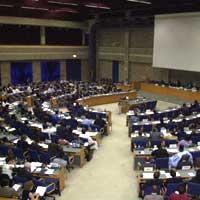Education for rural people: 11 African countries join forces to meet the challenge

Synergies identified at a meeting in Rome
Eleven African countries have agreed to join forces to meet the challenge of education for rural people. At a recent meeting in FAO headquarters in Rome they also decided to identify synergies and establish international technical cooperation aimed at enhancing education and training in rural areas.
Representatives from Burkina Faso, Ethiopia, Guinea, Kenya, Madagascar, Mozambique, Niger, Uganda, Senegal, South Africa and Tanzania adopted a series of recommendations directed to four main stakeholders: African governments; relevant ministries; multilateral and bilateral agencies; international higher learning and research institutions.
Governments were invited, among other things, to strengthen the coordination and synergies with education for rural people strategies and programs and to increase public resources for education and training in rural areas.
Relevant ministries (Education, Agriculture, Rural Development, etc.) were asked to work together to design programs that reflect local cultural and social values and that transmit problem-solving, production and enterprise development skills. They were also asked to collect and analyze relevant statistics and establish education management information systems in order to improve monitoring and management of education in rural areas.
Multilateral and bilateral agencies, particularly the FAO, ADEA and UNESCO, were requested to increase their support for capacity building and institutional strengthening of education for rural people. Special efforts should be made to disseminate and further expand the FAO electronic “Toolkit”.
International higher learning and research institutions were invited to provide scientific expertise, technical assistance and training in strategic areas of education for rural people at national and local levels, particularly with respect to addressing major research issues such as the impact of globalization, biofuels and climate change on rural livelihoods.
The meeting on Education for Rural People in Africa (Rome, 28 -29 November 2007) was a follow up to the ministerial seminar which took place in Addis Ababa, Ethiopia in September 2005.
Presently, rural people represent approximately 70 percent of the total population in Africa and will remain the majority over the next three decades, as it is projected that they will represent 58 percent in 2030.
Education and training for rural people is a strategic priority for sub-Saharan Africa in its fight to eradicate poverty, hunger, malnutrition and illiteracy. School life expectancy for men in this region of the world is of 8.5 years in urban areas as compared to 5.5 years in rural areas. For women it is respectively 7.6 and 4.3 years. Furthermore, for every 100 urban children who have access to primary education, only 68 do so in rural areas. And for every 100 children in urban areas who complete primary school, only 46 do so in rural areas.
Countries report progress
Country reports were presented at the meeting in FAO. In Mozambique where 71.4 percent of the population live in rural areas, the illiteracy rate in urban areas is 41.7 percent as compared to 65.7 percent in rural areas. Following measures taken by the government such as the suppression of school fees and the free distribution of textbooks in primary schools, school enrolment of 6 year-old children in the first grade has grown from 58.2 percent in 2005 to 70 percent this year.
In Burkina Faso, 1 077 schools were built during the last three years in rural areas. Mass campaigns to sensitise families to send girls to schools; scholarships for girls and school feeding programmes have contributed to increase school attendance.
In 2007, in South Africa, some 14 000 schools became no fee schools targeting the poorest rural communities. About 5 million school boys and girls have benefited from this measure. In some provinces, free transport is offered to students who live far from school. Currently 200 000 students benefit from this provision. A mass literacy campaign will be launched in 2008.
FAO is the lead agency regarding the Education for Rural People initiative. It works hand in hand with ADEA, UNESCO and others including the Italian Directorate for Development Cooperation (DGCS) and the French ministries of Agriculture and Foreign Affairs. ADEA ( www.ADEAnet.org ) promotes effective education policies that are designed and developed by Africans.
 Back and Next - Back and Next
Back and Next - Back and Next See Also - See Also
See Also - See Also